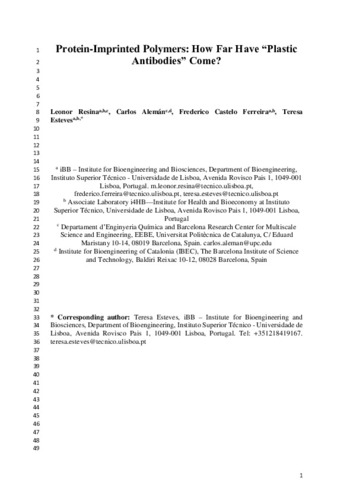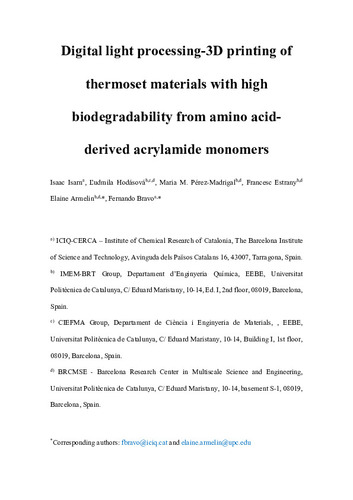Articles de revista: Enviaments recents
Ara es mostren els items 13-24 de 398
-
Conductive bacterial nanocellulose-polypyrrole patches promote cardiomyocyte differentiation

(American Chemical Society, 2023-06-21)
(American Chemical Society, 2023-06-21)
Article
Accés obertThe low endogenous regenerative capacity of the heart, added to the prevalence of cardiovascular diseases, triggered the advent of cardiac tissue engineering in the last decades. The myocardial niche plays a critical role ... -
Hydroxyapatite-filled osteoinductive and piezoelectric nanofibers for bone tissue engineering

(2023-12-31)
(2023-12-31)
Article
Accés obertIn this study entitled “Hydroxyapatite-filled osteoinductive and piezoelectric nanofibers for bone tissue engineering”, we describe the development of novel hydroxyapatite (HAp)-filled osteoinductive piezoelectric ... -
Mechanical properties of smart polypropylene meshes: effects of mesh architecture, plasma treatment, thermosensitive coating, and sterilization process

(American Chemical Society (ACS), 2023-05-26)
(American Chemical Society (ACS), 2023-05-26)
Article
Accés restringit per política de l'editorialSmart polypropylene (PP) hernia meshes were proposed to detect surgical infections and to regulate cell attachment-modulated properties. For this purpose, lightweight and midweight meshes were modified by applying a plasma ... -
Permanently polarized materials: an approach for designing materials with customized electrical properties

(American Chemical Society, 2023-01-01)
(American Chemical Society, 2023-01-01)
Article
Accés restringit per política de l'editorialThe development of experimental procedures to transform conventional materials into new materials with unique properties has become a necessity in many fields, as for example catalysis, electronics, electrochemistry and ... -
Protein-imprinted polymers: how far have “plastic antibodies” come?

(2023-11)
(2023-11)
Article
Accés obertAntibodies are highly selective and sensitive, making them the gold standard for recognition affinity tools. However, their production cost is high and their downstream processing is time-consuming. Molecularly imprinted ... -
Electroresponsive and pH-sensitive hydrogel as carrier for controlled chloramphenicol release

(American Chemical Society, 2023-02-23)
(American Chemical Society, 2023-02-23)
Article
Accés obertMultiresponsive hydrogels, which are smart soft materials that respond to more than one external stimulus, have emerged as powerful tools for biomedical applications, such as drug delivery. Within this context and with the ... -
Thermally-induced shape memory behavior of polylactic acid/polycaprolactone blends

(Elsevier, 2023-09-11)
(Elsevier, 2023-09-11)
Article
Accés restringit per política de l'editorialA study of the shape memory effect on extruded polylactic acid (PLA) and polycaprolactone (PCL) blends, which were transformed into films and movable components of articulated specimens by hot pressing and 3D printing, ... -
Aqueous alginate/MXene inks for 3D printable biomedical devices

(Elsevier, 2023-08-20)
(Elsevier, 2023-08-20)
Article
Accés restringit per política de l'editorialElectrochemically responsive hydrogel networks have been obtained using printable inks made of a biopolymer, alginate (Alg), and an inorganic 2D material, MXene (titanium carbide, Ti3C2Tx) nanosheets. While MXene offers ... -
Smart design of sensor-coated surgical sutures for bacterial infection monitoring

(2023-05-07)
(2023-05-07)
Article
Accés restringit per política de l'editorialVirtually, all implantable medical devices are susceptible to infection. As the main healthcare issue concerning implantable devices is the elevated risk of infection, different strategies based on the coating or ... -
Recent progress in biomedical sensors based on conducting polymer hydrogels

(American Chemical Society, 2023-04-28)
(American Chemical Society, 2023-04-28)
Article
Accés obertBiosensors are increasingly taking a more active role in health science. The current needs for the constant monitoring of biomedical signals, as well as the growing spending on public health, make it necessary to search ... -
Multimodal biomedical implant with plasmonic and simulated body temperature responses

(2023-04-28)
(2023-04-28)
Article
Accés restringit per política de l'editorialThis work presents a novel nanoparticle-based thermosensor implant able to reveal the precise temperature variations along the polymer filaments, as it contracts and expands due to changes in the macroscale local temperature. ... -
Digital light processing-3D printing of thermoset materials with high biodegradability from amino acid-derived acrylamide monomers

(2023-01-01)
(2023-01-01)
Article
Accés obertSix acrylamide resins, derived from l-phenylalanine and l-leucine, are designed for application in digital light processing (DLP) printers to obtain biodegradable thermoset polymers. The acrylamide copolymers are prepared ...







